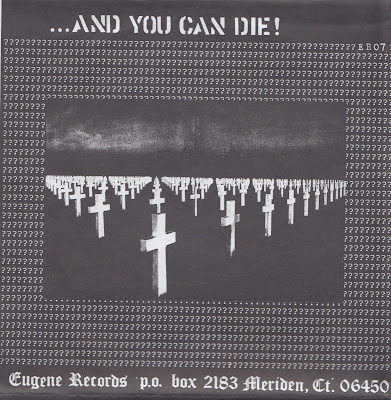This morning I woke up in a state of unease and confusion. Some crucial, almost existential, questions had kept me awake while I was lying in bed yesterday. I know some people who cannot sleep because they worry about their future or about upcoming events. Others have insomnia because they are overcome with anguish as soon as the lights goes out. But important matters such as these were not the causes for my sleeplessness. I was actually thinking about the Mankind? Ep and wondering about its actual worth and its relevance. It is not a fantastic record. It was not a game-changer at the time as far as I can tell. But it is still not a bad record, far from it. Nor is it an average one as it would colloquially imply mediocrity.
I would argue that "Won't you join the army now" is a typical record, in the sense that it typifies the sound of the US anarchopunk sound of the early/mid-90's. In a sense, it is a classic record although not really a classic (know what I mean?). And that's what got me thinking yesterday. In our modern world which neglects accurate contextualization and glorifies originality to the point of nonsensicality, is it necessarily bad to be typical? And what does it mean when one is discussing music? How does it relate to the listener's particular expectations? How do you engage with a "typical" work since such a classification can only be relevant from a retrospective point of view? Accusations of typicality are often uttered about current records and are often used as euphemisms for mediocrity, derivativeness or genericness. But none of these three substantives can apply to this Mankind? Ep and yet it is a typical record.
When you think about any punk subgenre, certain specific notions pop up, sometimes unconsciously. There is a set of legitimate expectations tied to each one of them. Bands that transcend subgenres are few and far between and even they always build upon a preexisting subgenre basis. Mankind? never really blew me away, though I do enjoy their records and their aesthetics. But to me, they are extremely relevant as a band that gathered all the defining elements of the 90's US anarchopunk wave. They were not spectacular nor groundbreaking, but what they did, they did well and this Ep probably remains one of the best examples of this sound. It is not the best record of the period but it concentrates most of the crucial characteristics of it and, in retrospect, it can be seen as a rich, and yet incredibly simple, synthesis of what came before and what would come, like a point of convergence.
Contrary to Aus-Rotten who glared lovingly at Discharge and the discharge-influenced sound of SoCal bands from their inception, Mankind?'s music (especially on "Won't you join the army") was decidedly punkier, owing a lot to UK82, 80's anarchopunk and early US hardcore, but pretty much deprived of (and not unlike Deprived) any influence from "extreme music". At a time - 1993 - when crust and fast, hard-hitting hardcore were still fresh and relatively new, this may have been a conscious move from the band although I don't feel too much intentionality in their music. This said, Mankind? definitely breathed 90's punk: from the vocals, to the production, the composition, the visual aspects, one is reminded of a simple and honest blueprint of 90's US anarchopunk. As I mentioned, the music on this Ep sounds like a meeting ground of several influence. Obviously, there is a strong UK influence (though the production can fool fools into dismissing it) from bands like Toxic Waste, Symbol of Freedom and The Sears (especially in the way the vocals are layered), but also from US-influenced mid-80's English anarcho bands like Dan or Sofa Head in the some of the rockier guitar-riffing. Another relevant point of comparison that is closer to home would be Media Children, notably in the high-pitched, Dirt-like screaming voice of Stacey. And of course, a UK82 vibe in terms of guitar tone and shouted male vocals inhabits some of the songs and "Rude awakening" is basically a rewriting of "Alternative" from The Exploited. The Ep having been recorded in 1993, the production gives the blend of these influences a clear 90's edge that would be found on most of this wave's records later on and bands like Antiproduct, Harum-Scarum or even so-called streetpunk bands shared meaningful similarities with Mankind?. In fact, if I had to introduce the basics of early/mid 90's US anarchopunk sound to a newbie, I might play him or her this Ep for its simple clarity and its unpretentious and unintended condensing quality.
Lyrically, the band was a straight-up and genuine political punk band and the expected topics of the day are dealt with on the Ep: the army, social inequalities, America at war and marriage. The Ep's visual aesthetics are reminiscent of the SoCal anarcho wave more than the UK one and, as the genre gloriously required, the cover is obviously a foldout one displaying a political poster. After "Won't you join army", Mankind? would record a split Ep with the reformed Dirt which Stacey actually joined on vocals for their European tour with Final Warning, with whom they shared a posthumous split Ep in 2000. Originally located in New Haven, Connecticut, members of Mankind? later joined other bands that will be familiar to anyone even remotely interested in 90's/00's US political punk like The Pist, Calloused or Behind Enemy Lines.










great record! love mankind? and stacy, for mw they were talented band.
ReplyDeleteAnother great record!
ReplyDeleteFor me, Mankind? was very important and I think all of their recordings are killer.
The first time I saw them was in Pittsburgh with DIRT, Aus-Rotten, and Naked Aggression. I knew some of the members from the Pist, etc., but was unprepared for how awesome they were. Saw them 5-6 more times and they never let me down.